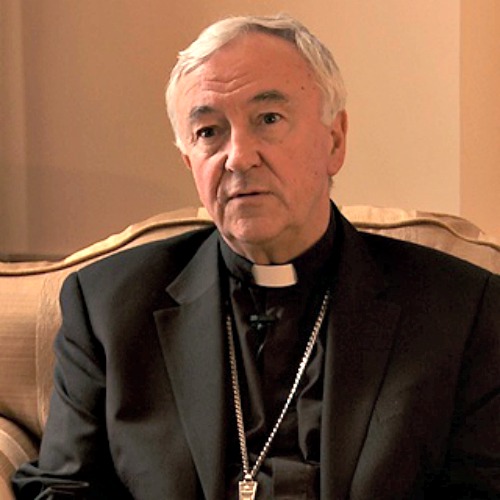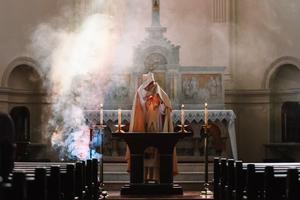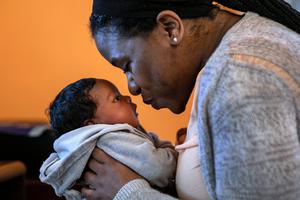Cardinal Nichols Shines Light on Migration, Marriage Prep at Family Synod
Speaking prior to the opening of the synod, the cardinal — who is president of the Catholic Bishops’ Conference of England and Wales — discussed the importance of marriage preparation and how it relates to the validity of marriage.

VATICAN CITY — The effects of migration and poverty upon families, the pastoral care of children, the Eucharist in connection to our understanding of marriage: These are a few of the themes that Cardinal Vincent Nichols, archbishop of Westminster, England, hopes to see raised during the synod on the family currently under way in the Vatican.
Speaking with CNA just ahead of the opening of the synod, the cardinal — who is president of the Catholic Bishops’ Conference of England and Wales — also spoke on the importance of marriage preparation and how it relates to the validity of marriage.
The Extraordinary Synod on the Pastoral Challenges of the Family in the Context of Evangelization runs through Oct. 19. It will be followed by an ordinary synod in 2015, which will explore the same theme.
What are your expectations from this synod?
It is a very remarkable occasion when cardinals and bishops from all around the world come together.
In fact, what it puts into my mind is … the letter that I received from Pope Francis when I was appointed a cardinal. He said: “We’re to have broader horizons and a larger heart.” So I expect to try and bring that attitude to listening to the situation of the family in all the corners of the globe.
I think that one of the themes that will emerge is the pressure that families are under through patterns of migration and patterns of poverty. I think we’ll hear a lot about those two things. And then, of course, what we’re looking for is our pastoral response. That, I think, will be the work of this synod, the period in between and then the synod next October.
With regard to these hopes that you have from this synod, particularly those concerning families affected by migration and poverty, do you have any concrete or even theoretical suggestions as to how the Church might provide pastoral care for those in such situations?
I think the use of the word “pastoral” is very crucial. The pastoral work of the Church, I think, is very nicely described as the Church as a mother. How do we accompany people? That’s a strong theme in the thought and the work and the expressions of Pope Francis. It is very much to do with action.
For example, we have a lot to develop in terms of the depth of the preparation that we ask people to do before they marry. We have a lot to do in terms of support that we give to families. And, it seems to me, that support has to be focused on the well-being of the children. I think when we start there, then we see what Pope St. John Paul II often said: that every new generation is a new field of evangelization.
The Church has to learn to be seed. We’re the grain; we’re the seed that is to be sown. We’re not here to build big barns and gather in the harvest. That’s the Lord’s work. We are here to sow seeds and to do so afresh in every generation.
It’s the children in the pastoral care of the family, I think, that should be in the forefront of our minds.
What are the pastoral concerns you are witnessing in England, in particular — for instance, the pastoral challenges arising from same-sex “marriage” having gained legal status? How are these new realities shaping pastoral care?
I think the real challenge that we face is how we understand grace and nature working together.
In a sense, patterns by which we say, “Oh, that’s what people do” or “That’s what the law permits people to do” is only a small part of the picture. But I’m afraid, for many Catholics, it has become the whole picture.
What I think we need to discover again is how Christ is present and an active partner in every marriage between a man and a woman. It’s the notion of marriage as sacrament, as a real sacrament. That is a really important thing. I think lots of Catholics at home want to find ways of really discovering that. I think we know we’re a bit different. And I think we’re beginning to just get the feel of what it is to live a Christian discipleship in a society that is moving away from the assumptions of Christianity as its starting point. But that’s okay. We’re to bear a witness and, therefore, to have deeper roots and a sense of Christ’s abiding presence, of Christ’s partnership, in a marriage; this is something we need to rediscover.
One of the more visible polemics surrounding this synod has to do with the question of admitting divorced-and-civilly- remarried persons to the sacraments. What is your perspective on how the polemic has played out within the media?
I’m more interested in how the debate in the synod takes place. I’m fairly certain that the expressions of different preoccupations and different views — and looking again at some of the studies of these matters over the centuries — quite frankly, is a good thing.
We need to look deeply at our understanding of marriage, maybe how it differs from an Eastern-Orthodox understanding of marriage.
We need to look at how we understand the Eucharist — what is the witness value of the Eucharist.
It’s very important that we remember that ... this extraordinary synod is just the first movement of a concerto. There’s another movement, which will be the period between the two synods. And then the synod next October [2015] will be the third movement, which is often the loudest. And then there will be a finale, which will be the reflections of Pope Francis.
We shouldn’t put all the expectations into these next two weeks. This is opening the themes that are going to be dealt with at depth and in prayer over the next two years.
What is the role of marriage preparation, and would you say there has been a problem of marriage preparation that has led to some of the confusion with regard to marriage and the Church?
A theme that is clearly being looked at already, even before the extraordinary synod begins, is the question of the validity of marriages that people enter. Validity is understood in the fullest sense of the content of the consent that they give, the understanding of the human qualities of marriage and their understanding of how grace [and] faith plays a part in that.
That’s all the business of marriage preparation — how do we bring people, a couple, to the point of celebrating this sacrament with as much awareness and acceptance and eager embrace of the great mystery that it is?
We’ve lived, I think, a bit by a lot of social conventions about marriage. Now, we have to find again its Christian roots.
- Keywords:
- ann schneible
- cardinal vincent nichols
- catechesis
- catholic faith
- catholic news agency
- ewtn news
- national catholic register
- synod_2ol4

















